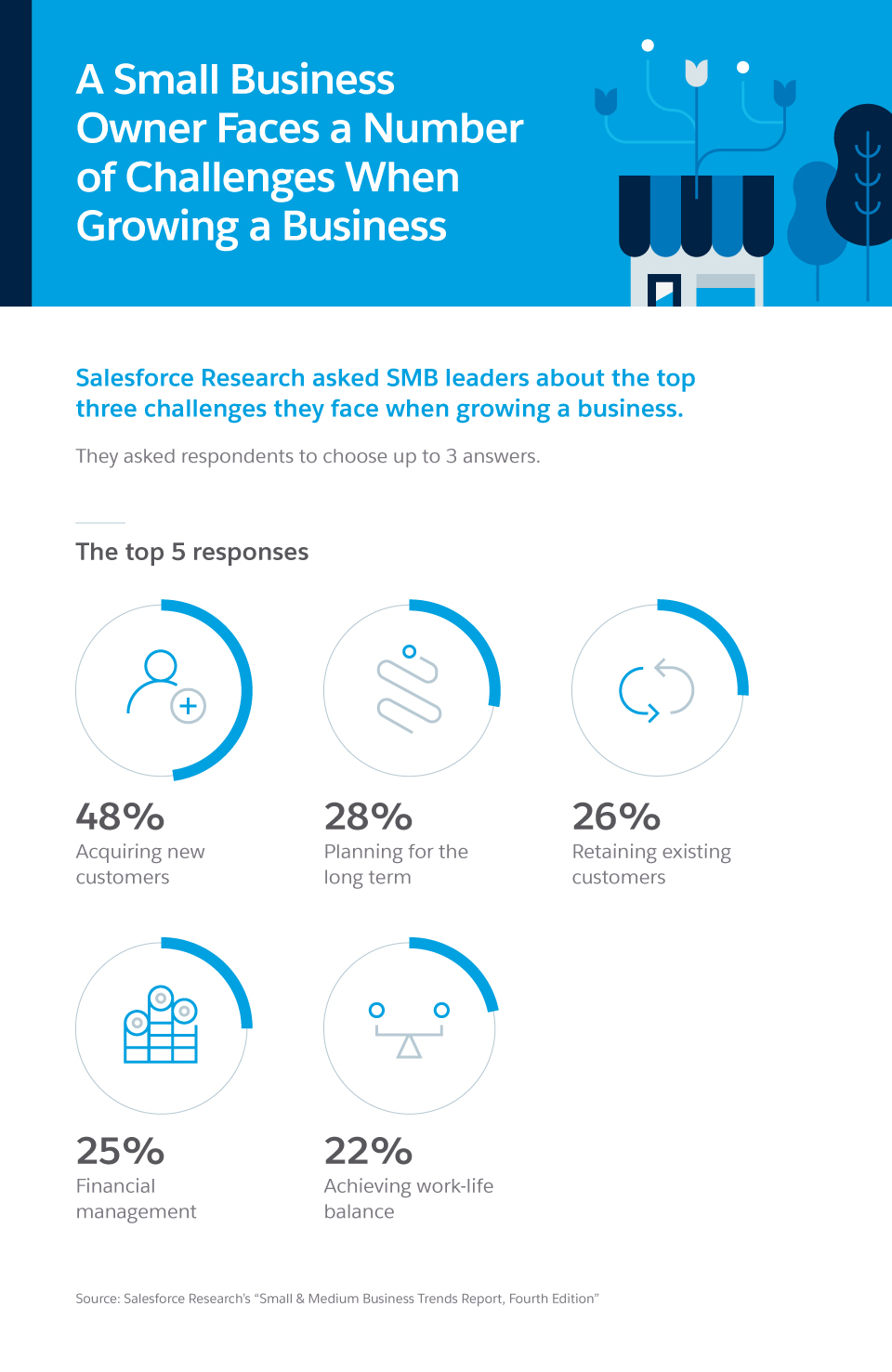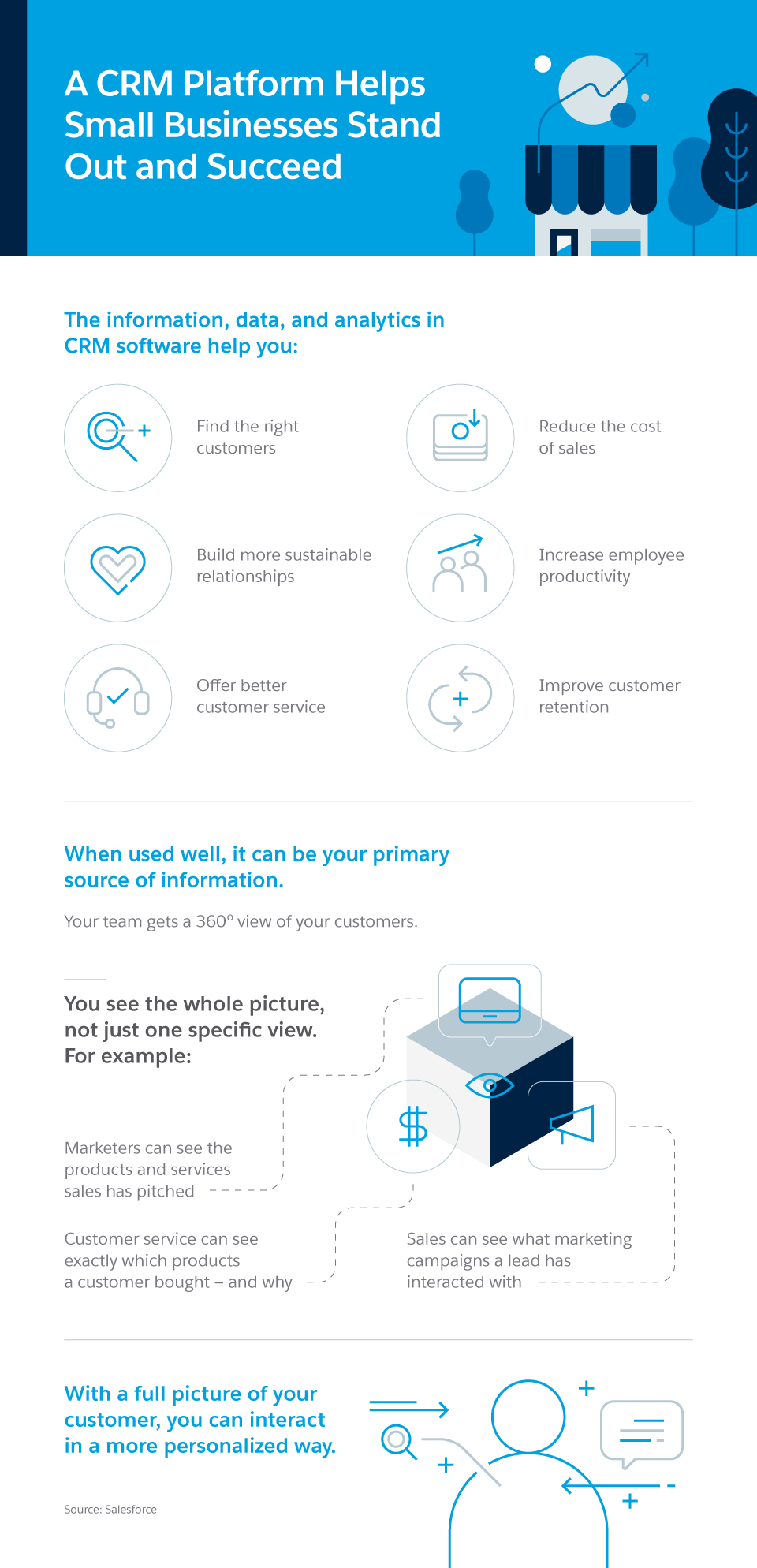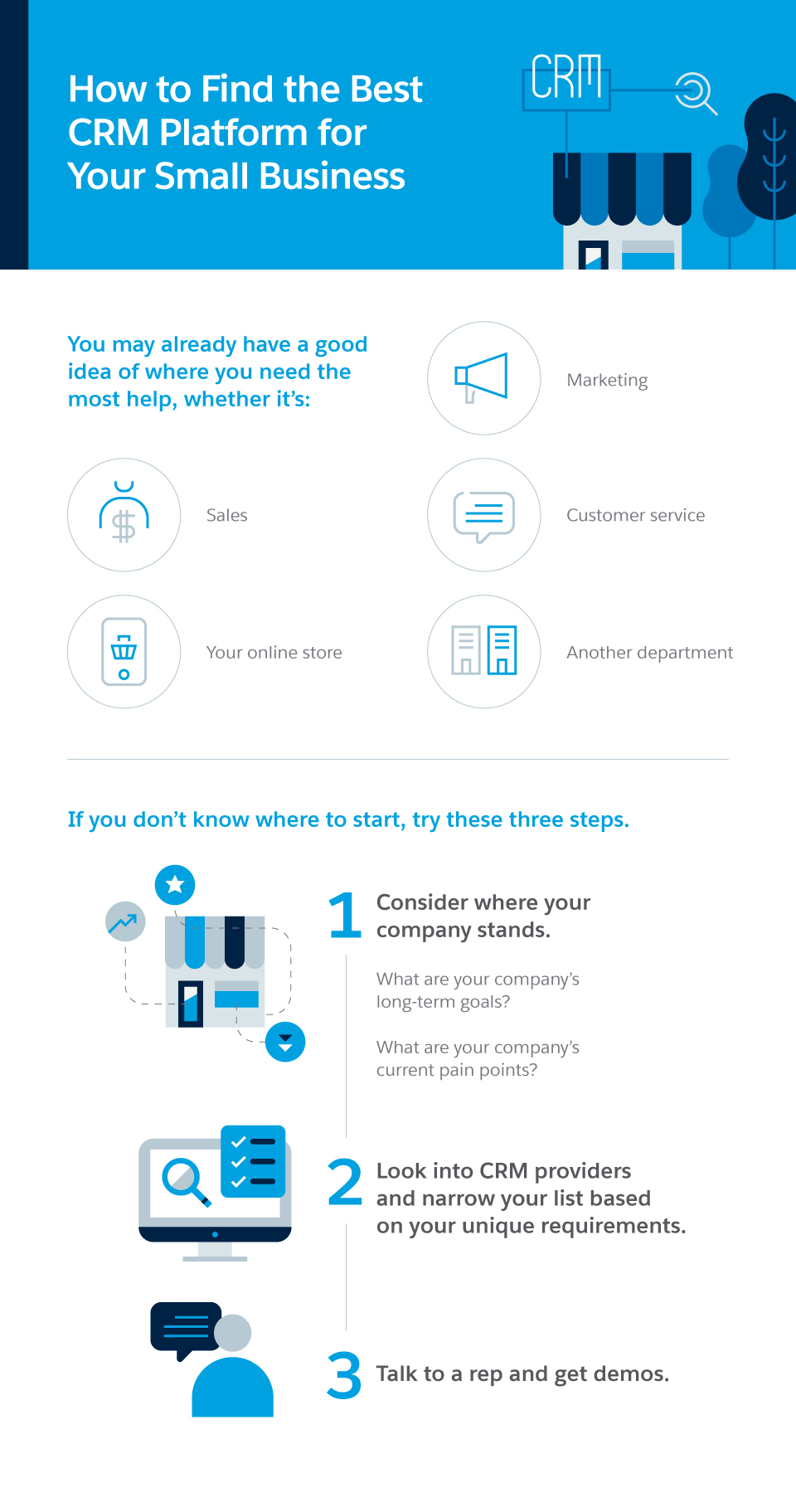Your small business is doing well. Customers are happy, and your marketing and sales efforts are fruitful. Everything is humming along, and it looks like the business will continue to grow. It’s an exciting time.
As your small business grows, questions pop up. With more employees comes more scattered information. And as the number of customers rises, the information increases. You need to track and manage your relationships with customers — their needs, how they’ve interacted with your company, what they’ve purchased, and issues they’ve resolved through customer service. After all, your customer relationships drive your success.
Even with the world’s most impressive spreadsheets, filing systems, and sticky notes, your small business must invest in a better way to keep organized. You and your team should be able to keep track of the needs of every customer and contact. You also need more advanced business tools as your business increases its market share, adapts to what employees and customers need, and plans for the future.
It’s time for your business to invest in a dedicated customer relationship management (CRM) platform. With all the choices available, it’s smart to devote time and research to determine what your small business needs. Your first step is to learn what a CRM system is and how it works with other business technology. Once you have a full view of what a CRM platform can do, you’ll have a better idea which software to invest in.

What is a Customer Relationship Management (CRM) System?
CRM software, also called a CRM platform or system, helps a business manage its relationships with customers and contacts. When a company uses CRM software to its greatest advantage, it provides all departments, including customer service, sales, business development, and marketing, a way to manage the relationships and interactions that propel success.
A CRM platform can help you grow your company in at least six key ways. The information, data, and analytics in this software can help you:
Find the right customers
Build more sustainable relationships
Reduce the cost of sales
Increase employee productivity
Offer better customer service
Improve customer retention
Your CRM Platform Should Be Your Primary Source of Information
A CRM system can manage a staggering amount of information. Your team’s manual input can create enough usable data to help you keep up with customers, uncover trends, and predict future sales.
However, the beauty of a CRM system is that it’s made for more than just manual data entry. When you integrate your CRM platform with other software, the two programs can pass information to each other either automatically or on-demand. Thus, your CRM system can automatically upload pertinent data from other resources, such as your email marketing software. You can also manually sync data from other systems, such as a spreadsheet with data downloaded from your Facebook page. This additional data and information give you and your team an even clearer view of your customers and how your business functions.
Your CRM platform can be the single source for your business’s data and information. It allows employees to quickly find pertinent information, from the company’s big picture to a single customer’s history.
When your team uses it properly and keeps the data clean, it serves as an electronic contact list, a detailed record of all interactions between your company and customers, and a way to accurately determine the health and efficiency of your company. An organized business where every employee can access complete, up-to-date data can empower your workforce to serve customers in a personalized, efficient, and satisfying way.

Get to Know the CRM Ecosystem: Multiple Programs Working Together
Your CRM platform can manage data from multiple CRM programs for different departmental needs: marketing, sales, customer service, ecommerce, manufacturing, and others. However, a customer service representative doesn’t need to log into your CRM platform and select the program for customer service management. The rep simply logs in to their program, which syncs with all programs in the CRM ecosystem, and the pertinent data appears on the screen.
The point of a CRM platform is to make sure that everyone’s on the same page when it comes to understanding the customer. The platform gives every employee a clear, easy-to-understand view of a customer’s relationship with the company.
How to Choose CRM Software for Your Small Business
If you’re ready to look into a CRM system, you likely already know where you need the most help. You may recognize one of these scenarios.
If your marketing department struggles to find potential new customers or you have several different types of customers who need different marketing campaigns, you likely need marketing software.
If your sales team can’t determine when a lead is ready for a sales pitch or you need more accurate sales forecasts and reporting, then you should look into sales software.
If your ecommerce website isn’t sophisticated enough for the growing number of customers who want your products or you have trouble tracking your inventory, you may benefit from software that helps online retailers.
If your customer service agents can’t determine if a customer has already contacted the company with a question or identify the previous questions the customer has asked your customer service team, you likely need software for customer service teams.
If you have an idea of your needs, a conversation and demo with a CRM provider may help you decide quickly. However, what if you’re unsure? What if you feel like you need programs for every department, and you’re overwhelmed at the thought of introducing new technology?

In this case, you have three steps to take.
1. Consider your company’s pain points and goals.
Start by answering these questions.
What are your company’s long-term goals?
What are your company’s current pain points?
Any company striving for growth or long-term, sustained success needs to have a good idea of its overall health. It needs to understand current obstacles as well as short- and long-term goals. Knowing about issues or hindrances to growth means you can address them; knowing your small business’s goals gives you direction.
Direction helps make every decision clearer. For example, if your primary long-term goal is 90 per cent customer retention, your team can steer resources and energy away from the top of the funnel, where leads and new customers are, and concentrate efforts on the bottom of the funnel toward your current customers.
2. Look into CRM providers and narrow your list based on your unique requirements.
It may take some time and research to evaluate CRM systems. It’s important to know about your company’s health first: With that knowledge, you can look at different providers with a more discerning eye.
If your long-term goals include massive growth and international brand recognition, you need a CRM platform that can fit your needs and scale as your company expands. Conversely, if your long-term goal is to comfortably maintain your small business with fewer hurdles and a greater focus on customer experience, you need a CRM system for small businesses.
3. Talk to a rep and get demos.
Some providers focus on small business owners who are new to the idea of CRM software. Others cater to companies who need minimal help. No matter where you fall on the spectrum, you can get insight into which CRM platform is right for your business by following these steps.
Read review sites.
Check providers’ customer success stories.
Watch YouTube videos about the platform.
Ask reps questions.
Get a personalized demonstration of the software.
Be honest with your potential CRM provider about your requirements and current and future needs. Your small business deserves the best CRM platform to help it thrive, and your provider should be a partner to help you accomplish your goals.
Your CRM Platform Will Help Your Small Business Succeed
Investing in software to build better customer relationships can propel your company from being just another small business to one ready to fully compete in the market. Employees and customers will appreciate your improved efficiency and greater ease of doing business.


